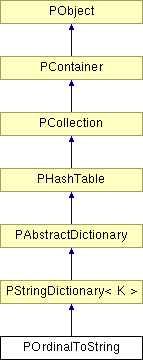
PString objects, keyed by an ordinal value.
More...
#include <pstring.h>
Inheritance diagram for POrdinalToString:

Public Member Functions | |
Construction | |
| POrdinalToString (PINDEX count, const Initialiser *init) | |
| Initialise the ordinal dictionary of strings from the static array. | |
Overrides from class PObject | |
| virtual void | ReadFrom (istream &strm) |
| Input the contents of the object from the stream. | |
Classes | |
| struct | Initialiser |
| Structure for static array initialiser for class. More... | |
PString objects, keyed by an ordinal value.
It has all the usual functions for a collection, with the object types set to PString pointers. The class could be considered like a sparse array of strings.
In addition some addition functions are added that take a const PString reference instead of a pointer as most standard collection functions do. This is more convenient for when string expressions are used as parameters to function in the collection.
See the PAbstractDictionary and PStringDictionary classes and PDECLARE_DICTIONARY and PDECLARE_STRING_DICTIONARY macros for more information.
| POrdinalToString::POrdinalToString | ( | PINDEX | count, | |
| const Initialiser * | init | |||
| ) |
Initialise the ordinal dictionary of strings from the static array.
| count | Count of strings in initialiser array |
| init | Array of Initialiser structures |
| virtual void POrdinalToString::ReadFrom | ( | istream & | strm | ) | [virtual] |
Input the contents of the object from the stream.
This is primarily used by the standard operator>> function.
The default behaviour reads '\n' separated strings until !strm.good().
Reimplemented from PObject.
 1.4.7
1.4.7